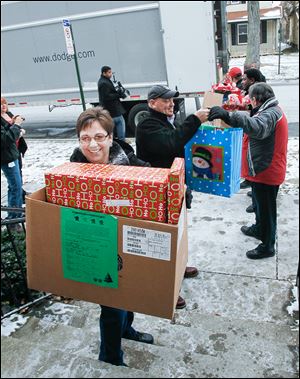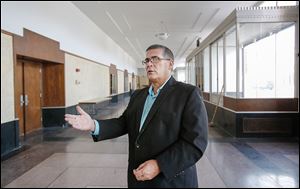
Local shelters’ wish list puts emphasis on basics
12/22/2013

Toledo Machining Plant workers, including Pam Young, foreground, help form an assembly line to get a tractor-trailer full of presents to the children at Family House.
Last in a series
Underwear and cleaning supplies.
Toilet paper.
Paper plates, paper towels, napkins, and cups.
Oh, and one other thing: Getting people who can afford to buy their own meals to stop in and get one for free.
Ask people who run two of Toledo’s busiest homeless shelters what they really need this holiday season — again, what they really need, not what the public usually gives them — and the answers may surprise you, especially as cold as it’s been lately.
Sure, they could use more hats, gloves, parkas, backpacks, boots, and socks.
Such items are never turned down.
But you wanna know what’s most needed at Family House?
“Underwear,” said Renee Palacios, Family House executive director. “Underwear, for sure. Nobody ever wants to donate it, but we need underwear now. It’s our biggest need throughout the year.”

Isabella Mason, 3, talks with Santa Claus while Family House Executive Director Reneé Palacios and Breelyn Jeffers, 2, look on. Chrysler’s Toledo Machining Plant employees recently delivered hundreds of gifts to children at the shelter.
Cleaning supplies are the second most-coveted item. They help defray the cost that Family House incurs tidying up the place, keeping germs down to a minimum, and reducing the odds of catching a contagious flu bug, Ms. Palacios said.
Same goes for paper plates, paper towels, napkins, and cups.

Dan Rogers of Cherry Street Mission Ministries, shown giving a tour of the former Macomber High School earlier this year, encourages potential donors to simply stop in, pull up a chair next to homeless people, and have a meal with them — on the house.
A practical approach
Family House now serves 35 families, or 107 people.
The facility, at 669 Indiana Ave., is one of the few shelters that allow families of mixed genders to be housed together in the same room.
It spends $700 a month on average for cleaning supplies and paper products.
Getting them donated reduces overhead, Ms. Palacios said.
“One hundred and seven people. That’s a lot of butts,” Ms. Palacios said, laughing. “But let’s be honest. We’re humans. Humans need toilet paper.”
Ms. Palacios’ advice may blow the lid off conventional thinking this holiday season, when potential donors get goosebumps thinking of the Charles Dickens’ classic, A Christmas Carol, and how they might get over their Scroogelike tendencies by donating a scarf, a pair of mittens, or a coat to the Tiny Tims of the world.
After all, there’s something to be said for warmth. It equates to compassion.
But the biggest help for any homeless shelter is to be practical, to think beyond the holiday season, and not be limited by tunnel vision.
It’s a 12-month job running a homeless shelter.
Too many similar donations at Christmas aren’t as effective as giving what’s most practical and what’s most needed on a year-long basis, Ms. Palacios said.
Think of the last potluck dinner you attended when everyone brought desserts.
Who really benefits the most when donations aren’t as effective as they could be?
The needy? Or the donors?
“It’s the biggest source of frustration for all homeless shelters. But you can’t say it out loud, or you’ll sound ungrateful,” Ms. Palacios said. “It’s a delicate balance, because we’re so appreciative of what anybody does.”
If you really want to be an effective donor, do one thing: Ask.
Nothing makes homeless shelter directors happier than people who take the time to find out what what their facilities and clients need most, Ms. Palacios said.
Underwear, cleaning supplies, and paper products are in high demand at Family House.
But what’s on the wish list of the area’s largest homeless shelter, Cherry Street Mission Ministries?

Caring people
Free meals for would-be donors, said Dan Rogers, the mission’s president and chief executive officer.
Don’t get him wrong: Cherry Street Mission Ministries needs money.
Based at 105 17th St., it has multiple facilities.
It is to embark on a $13 million to $14 million renovation of the former Macomber Vocational High School in 2014, by far the most expensive and financially risky endeavor in the agency’s 66-year history.
But this holiday season, Mr. Rogers said he encourages potential donors to simply stop in, pull up a chair next to homeless people, and have a meal with them — on the house.
“We need more than a meal today. We need people who care about us,” Mr. Rogers said. “Come down and share yourself with us.”
He said the mission is putting out the invitation because it believes getting to see homeless people face-to-face will help demystify poverty.
It also gives homeless people a lift, Mr. Rogers said.
“Put some ‘normal’ into the life of a person who’s going through an abnormal living condition. You’ll be amazed. It means so much,” he said. “Break bread with us.”
Cherry Street Mission Ministries’ Macomber project is being phased in over five years.
Mr. Rogers envisions the mammoth structure and its 252,000 square feet of empty space eventually being used for concerts, fine arts, basketball games, fitness activities, community banquets, gardening, car repairs, dining, and other unconventional uses beyond its main purpose as a homeless shelter. He is open to all ideas to help bridge the gap between the haves and have-nots on a year-round basis.
Cherry Street purchased the building for $380,000 earlier this year, considerably less than the $500,000 that its last owner paid for it in 2008. But real estate prices throughout the country have fallen since the global financial crisis of 2008, especially in central Toledo.
The mission spent $400,000 this fall to get Macomber’s roof stabilized and the first of three boilers installed to stave off further deterioration, Mr. Rogers said.
Gift of interaction
At Family House, Ms. Palacios saw firsthand the gift of interaction again on Dec. 13, when employees from Chrysler Group’s Toledo Machining Plant delivered hundreds of Christmas gifts to the shelter.
It was the 14th year that plant employees have done that.
Sixty-five of Family House’s residents are children.
The average age of a homeless child today is 4 years old, according to Ms. Palacios, who said that mirrors the demographic at Family House.
Christmas brings a lot of anxiety to children that young because homeless families usually move two or three times a year.
A common refrain from the youngsters is whether Santa Claus has kept up with their moves.
Family House and its supporters make a point of telling the kids that Santa Claus hasn’t forgotten them and will find them.
“Their sense of normalcy is bad as it is,” Ms. Palacios said. “It’s such a special moment to see a child’s eyes light up as they hear Santa’s bells.”
Invariably, at least one homeless child at every Christmas party tells Santa he or she wants a home.
“That gets the adults crying,” Ms. Palacios said.
She said the gesture from Chrysler is an example of how the community’s generosity helps lift spirits. The employees had the gifts delivered in the back of a tractor-trailer and formed an assembly line to get them inside.
“We can only make it possible if people step forward to do that,” Ms. Palacios said.
Don DeKeyser, Toledo Machining Plant manager, said employees “take great pleasure in being able to deliver a little holiday magic to the children at Family House every year.”
“Because this community stood by us during our most difficult time, it is now our responsibility to return the favor by bringing smiles to the faces of those most in need,” Mr. DeKeyser said.
Contact Tom Henry at: thenry@theblade.com or 419-724-6079.